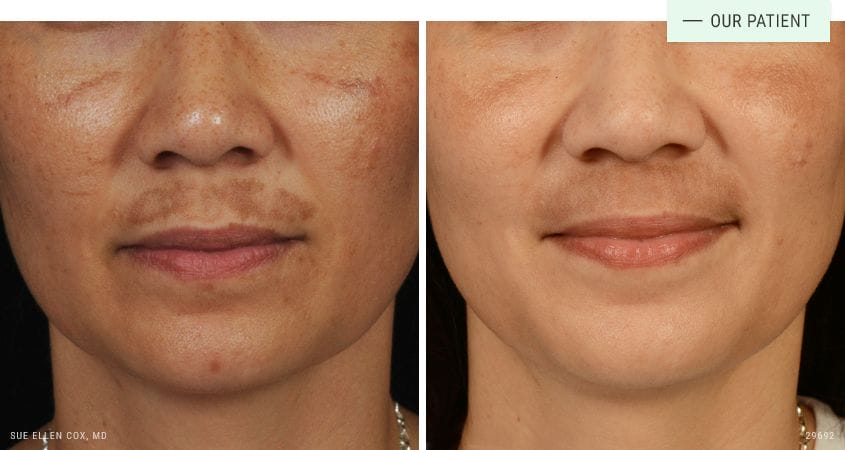Q&A with Dr. Cox: What is Melasma?

Melasma can be one of the more frustrating conditions our patients face. Although there is no cure, treatment can successfully manage this pigment issue. We sat down with Dr. Cox to learn what is melasma and what are the treatment options?
Q: What is it?
A: Melasma is a common skin problem that presents as brown or gray patchy pigmentation. It typically appears on the cheeks, bridge of the nose, forehead, chin, and above the upper lip. Melasma may occur on other parts of the body that get a lot of sun, such as the forearms and neck. It occurs far more commonly in women than in men, and is especially common in women with darker skin. Sun damage is a trigger, as are hormonal changes. Melasma is so common during pregnancy that it has earned the nickname “the mask of pregnancy.”
Q: Can melasma be treated?
A: Melasma has no cure, and can be resistant to treatment. It may take time to fully treat the appearance of existing melasma. A combination of treatments may work best. Working with a board-certified dermatologist is important for proper diagnosis of any skin condition, and development of a treatment plan that works well for you.
Q: What medications are typically prescribed?
A: One option is hydroquinone. Hydroquinone is considered among the most effective treatments of melasma. It is applied topically to the pigmented areas and lightens the skin over time and is well tolerated. Medications containing hydroquinone can be purchased over-the-counter, or in higher concentrations with a prescription. We recommend medical-grade skin care products, such as the Obagi system, which has been clinically tested and contains prescription-strength hydroquinone products.
Tretinoin gel (the generic form of Retin A) may be prescribed in combination with hydroquinone. Tretinoin helps to increase the rate at which the skin turns over, which can enhance the efficacy of the hydroquinone.
Q: What about in-office treatments?
A: Many patients may also benefit from laser treatments like Fraxel or a series of Clear + Brilliant treatments. These lasers help to lift pigment from the skin. Clear + Brilliant is a gentler treatment, with no true downtime. Multiple treatments are typically necessary. Fraxel is more intensive and produces more dramatic results in fewer treatments, but requires about four days of recovery. It’s important to seek out a laser specialist who is experienced in treating melasma. Improper laser settings by the provider, or failure to follow post-care instructions by the patient, can lead to hyperpigmentation and worsen the problem.
In some cases, chemical peels such as the VIPeel and Vitalize Peel may also help. These peels both contain a combination of vitamins and acids that treat deep enough in the dermis to reach melasma. As an added benefit, the VIPeel and Vitalize Peel are fairly gentle treatments with a low risk of making the pigment darker, something that can happen with laser treatment, especially with darker skin tones.
Q: What lifestyle changes are helpful in managing melasma?
A: Regardless of treatment, sun protection is essential for melasma patients. Treatment that removes the appearance of melasma does not prevent new pigment from forming. Sun damage can trigger or worsen melasma, and treatment for melasma can also make the skin more sensitive to the sun. Avoid sustained time in the sun, and wear hats and long sleeves when you can’t avoid it. Look for a good, medical-grade sunscreen with physical-blocking compounds like Zinc Oxide and Titanium Dioxide. Avoid sun exposure, and make sure to reapply sunscreen every two hours if you plan to be outside for a prolonged time. We often also recommend HelioCare, a natural supplement that increases sun protection from the inside out. When in doubt, our skincare team is on hand put together a customized regimen for melasma patients.
—
If you’re struggling with melasma, we’re here to help. To learn more about your options, contact us by phone at (919) 289-4645 or at appointments@aesthetic-solutions.com.
